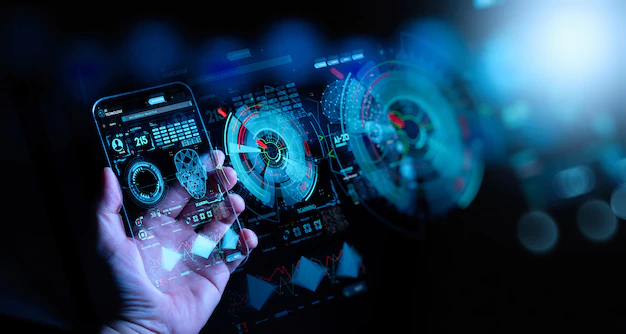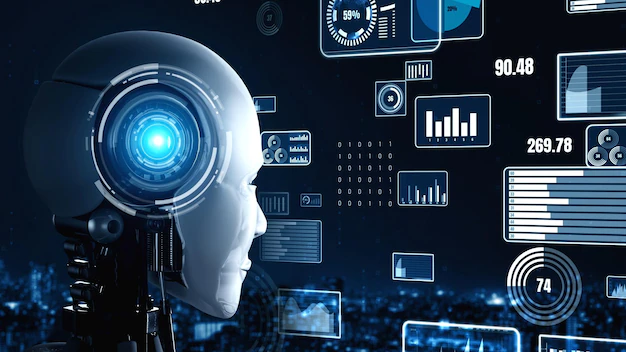Main Highlights:
- The Benefits of AI for Blockchain
- Using AI, you can make your technology better.
- Applications of Blockchain and AI
- Applications in Real Life
- AI AND BLOCKCHAIN
Virtually every business in which they are used is benefiting from the combination of AI and blockchain, which is proving to be pretty potent.
Everything from the logistics of the food supply chain and the sharing of medical records to media royalties and financial security is being improved by the convergence of blockchain and AI (artificial intelligence). Security will benefit from the integration of AI with blockchain since it will act as a twofold barrier against cyberattacks.
A large dataset can be efficiently mined by AI to generate novel scenarios and identify patterns in data behaviour. Effectively removing errors and false data sets are made possible by blockchain. A decentralised blockchain infrastructure can be used to authenticate new classifiers and patterns produced by AI.
Any business that interacts with customers can use this, including retail transactions. Blockchain infrastructure can be utilised to collect client data, which can then be leveraged to power marketing automation with artificial intelligence.

The Benefits of AI for Blockchain
The integration of AI and blockchain results in possibly the most trustworthy technology-enabled decision-making system ever created, one that is essentially tamper-proof and offers dependable insights and conclusions. It has various advantages, including:
• Enhanced commercial data models
• Internationalized verification methods
• Creative systems for audits and compliance
• Financial prudence
• Transparent leadership
• Adaptive retail
• Using intelligent prediction
• Rights to a digital intellectual property
Using AI, you can make your technology better.
Security: By ensuring secure application deployments in the future, AI-enhanced blockchain technology becomes safer. A good illustration of it is the rising use of AI algorithms to decide whether financial transactions are fraudulent and ought to be stopped or investigated.
Efficiency: AI can help optimise calculations to lower miner load, which results in less network latency and speedier transactions. Blockchain technology’s carbon footprint can be reduced thanks to AI. If AI machines take over the task currently done by miners, the cost that is imposed on them as well as the energy used would be decreased.
Blockchain data can also be subjected to AI’s data pruning algorithms, which automatically prune the data that won’t be needed in the future as the amount of data on them increases minute by minute. AI can even introduce brand-new, highly efficient decentralised learning systems, such as federated learning or new data-sharing strategies.

Trust: One of blockchain’s unique selling points is its immutable records. When AI is used in conjunction with other technologies, people have access to detailed records that show how the machine thinks.
As a result, machine-to-machine interaction increases, and the bots become more trusting of one another, which enables them to share information and coordinate group decisions.
Better Management: Human experts become better at deciphering codes over time as a result of practice.
The need for human expertise in a mining formula powered by machine learning can be eliminated since, with suitable training data, the formula can almost instantly improve its skills. AI hence also aids in improving the management of blockchain networks.
Security of Private Data and the Creation of New Markets: The creation of data markets and model markets results from the sale of private data.
Markets benefit from simple, safe data sharing that enables smaller participants to gain The use of “Homomorphic encryption” techniques can strengthen the privacy of blockchains. It is only possible to conduct operations directly on encrypted data when employing homomorphic methods.
Storage: Blockchains are perfect for storing extremely private and sensitive data, which can be handled intelligently using AI to bring value and convenience. An excellent illustration of such is smart healthcare technology that uses information and scans from patients to establish precise diagnoses.

Applications of Blockchain and AI
Smart Computing Ability
A blockchain would require a significant amount of processing power to operate on a laptop with all of its encrypted data.
For instance, the hashing algorithms that are used to mine Bitcoin blocks adopt a “brute force” strategy, which entails meticulously listing all potential candidates for the answer and determining whether each candidate satisfies the problem’s statement before concluding a deal.
AI gives the United States the chance to go away from this and approach tasks in a very much more intelligent and cost-effective way. If given the right training data, a machine learning-based algorithm may theoretically improve its skills in “real-time.”
Making Multicultural Data Sets
Blockchain technology, in contrast to computing-based initiatives, builds suburbanized, transparent networks that can be accessible by anybody, anywhere in the world, in the case of a public blockchain network.
Making an API of APIs available on the blockchain would enable AI agents to communicate. As a result, different algorithms might be created using different knowledge bases.
Privacy Protection
AI gathers information about the world and what’s happening in it through knowledge. The ability of AI to continuously improve itself depends on the knowledge it is fed. On the other hand, blockchain essentially enables the storage of encrypted data on a distributed ledger. It enables the construction of completely secured databases that are accessible to those who have permission to do so.
Financial or medical information is too private to entrust to one company’s algorithms. We may reap the huge benefits of personalised suggestions while securely maintaining our sensitive data by storing this data on a blockchain, which can be accessed by an AI but only with permission and after it has followed the right protocols.
Monetization of Data
The validation of information is another controversial breakthrough that might be possible by integrating the two technologies. For big businesses like Facebook and Google, monetizing acquired data is a significant source of income. Data is being used against us when it is left up to third parties to decide how it is sold to make money for businesses.
Blockchain enables the United States to protect our knowledge cryptographically and use it in the way we typically do business. Additionally, this protects the privacy of our personal information while allowing the U.S.A. to legitimate knowledge in person if we choose to.
To resist biased algorithms and produce varied data sets in the future, it is crucial to comprehend this. The same holds for AI applications that demand our understanding.
AI networks will need to purchase data from data providers directly through data marketplaces for AI algorithms to learn and improve.
This will make the entire process much more honest than it is now and prevent tech companies from taking advantage of their people. A knowledge market of this kind will also make AI accessible to smaller businesses. For businesses that don’t provide their information, the cost of developing and maintaining AI is absurdly high.
Putting Faith in AI Decision-Making
All of the data, variables, and procedures that AIs employ for their decision-making processes are immutably recorded via blockchain technology.
As a result, auditing the whole process is made significantly simpler. The procedures from data entry to conclusions can all be tracked on a blockchain with the right technology, and anyone watching the data can be confident that it hasn’t been tampered with.
Trust is built in the findings reached by AI programmes as a result. This is an important step because without an understanding of how AI apps work and the data they rely on, people and businesses won’t begin to use them.

Applications in Real Life:
1. FINALIZE.
Building applications focused on enhancing civil infrastructure can be done using the software platform Finalize, which uses blockchain and machine intelligence.
The business’s technologies streamline and automate workflow, management, and verification processes in the construction sector. To meet safety requirements, its technology also interfaces with wearables. In a sector whose sales are anticipated to reach $15.5 trillion by 2028, Finalize seeks to increase efficiency while increasing ROI.
2. BLACKBOX AI
For cutting-edge technology, Blackbox AI creates artificial intelligence tools. To enable everything from machine learning and natural language processing to blockchain tools, the company’s developers design a unique information architecture.
The company not only creates the infrastructure for blockchains but also provides advisory services that concentrate on how their solutions may optimise a blockchain’s potential. Blackbox AI’s engineers are from some of the biggest tech companies in the world, including Apple, Intel, NVIDIA, and MIT, and they have created AI-based tools for everything from virtual reality to natural language processing.
They weren’t much more than buzzwords before, but not any longer. Blockchain and artificial intelligence (AI) have developed into cutting-edge technologies that drive innovation in practically every industry.
AI AND BLOCKCHAIN
Everything from the logistics of the food supply chain and the sharing of medical records to media royalties and financial security is being improved by AI and blockchain technology.
Each is addressing some of the largest problems in the world, from blockchain’s capacity to track and trace food supply chains to the integration of AI in nearly every aspect of healthcare.
It turns out that they operate well together too, constructing and organising enormous databases, enhancing cybersecurity protocols, and completing jobs faster than it would take a person.
Here are 3 businesses that are successfully fusing blockchain and AI.

Bext360
Denver, Colorado.
The coffee, lumber, fisheries, and mineral industries all benefit from Bext360’s use of AI and blockchain to increase supply chain transparency and effectiveness. Artificial intelligence used by the business analyses crops and forecasts growth patterns, and blockchain ensures the documentation of a product’s supply chain from seed to final product.
To make the journey from bean to cup more transparent and ethical, Bext360 has integrated blockchain, mobile apps, and bots into the coffee supply chain.
While the blockchain immutably records the farm from where the beans originated and the precise parameters of a coffee shipment, the company’s artificial intelligence (AI) evaluates the quality of coffee beans and forecasts weather and growing patterns. To make sure that everyone is paid fast and equitably, it even serves as a payment ledger.
WealthBlock
Illinois, Chicago.
AI is a SaaS platform that manages automated marketing and communications for firms seeking funding. Companies may be confident they’re dealing with only top-notch partners thanks to a blockchain that supports the company’s investor referral and suitability assessment process. Furthermore, Wealthblock’s AI automates content and maintains constant investor engagement.
With the help of a partnership between WealthBlock.AI and the payments service Dwolla in 2018, investors may now submit ACH payments for hedge funds, venture capital, and real estate. To link more businesses with tZERO’s alternative asset and fund trading system, WealthBlock.AI and tZERO teamed in 2021.
Cyware
New York, New York is the location.
Cybersecurity and threat intelligence solutions from Cyware Labs include AI and blockchain-based capabilities. For instance, the Cyware Situational Awareness Platform (CSAP), which powers a mobile threat intelligence, protected messaging, and suspicious incident reporting platform, makes use of those tools. As a result, users are given a thorough overview of their real-time mobile cybersecurity protocols.
The Global Resilience Federation is already implementing the role-based secure communication and information-sharing solution that Cyware Labs and the GRF jointly developed in 2021 for its analysts in the legal and utility sectors.








